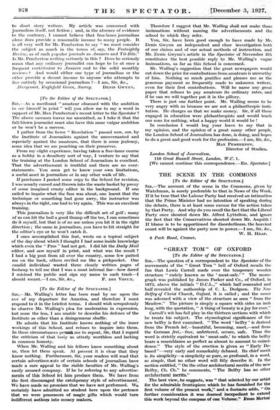[To the Editor of the SPECTATOR.] SIR,—Mr. Walling's letter has
been read by me upon the eve of my departure for America, and therefore I must respond to it in the briefest terms. I should wish scrupulously to observe Mr. Walling's plea for moderation in expression, but none the less, I am unable to describe his defence of the Institute as other than a disingenuous shuffle.
He admits that his Institute knows nothing of the inner workings of this School, and refuses to inquire into them. In these circumstances permit, me to repeat, Sir, that I regard the criticism of that body as utterly worthless and lacking in common honesty.
When Mr. Walling and his fellows know something about us, then let them speak. At present it is clear that they know nothing. Furthermore, Sir, your readers will read that certain advertisements of certain schools of journalism have made a sure appeal to the risible faculties of Mr. Walling's easily amused company. If he be referring to any advertise- ments of this School let him produce them. We have from the first discouraged the catchpenny style of advertisement. We have made no promises that we have not performed. We certainly have admitted no student here upon the pretence that we were possessors of magic gifts which would turn indifferent authors into money makers.
Therefore I suggest that Mr. Walling shall not make those insinuations without naming the advertisements and the school to which they refer.
You, Sir, have been good enough to have made by Mr.
Denis Gwynn an independent and close investigation both of our claims and of our actual methods of instruction, and Mr. Denis Gwynn's article in the Spectator of November 5th constitutes the best possible reply to Mr. Walling's vague insinuations, as far as this School is concerned.
Mr. Walling's suggestion that the great newspapers would cut down the price for contributions from amateurs is unworthy of him. Nothing so much gratifies and pleases me as the generous payment so frequently made to unknown writers, even for their first contributions. Will he name any great paper that refuses to pay amateurs its ordinary rates, and if he can we will together put it in the pillory.
There is just one further point. Mr. Walling seems to be very angry with us because we are not a philanthropic insti- tution. He charges us that we make money. Sir, if all those engaged in education were philanthropists and would teach our sons for nothing, what a happy world it would be !
In conclusion I would beg your leave to say that in my opinion, and the opinion of a great many other people, the London School of Journalism has done, is doing, and hopes to do a great and good work for the profession.—I am, Sir, &c.,
MAX PEMBERTON,
Director of Studies.
London School of Journalism, 110 Great Russell Street, London, W.C. 1.
[We cannot continue this correspondence.—En. Spectator.]










































































 Previous page
Previous page